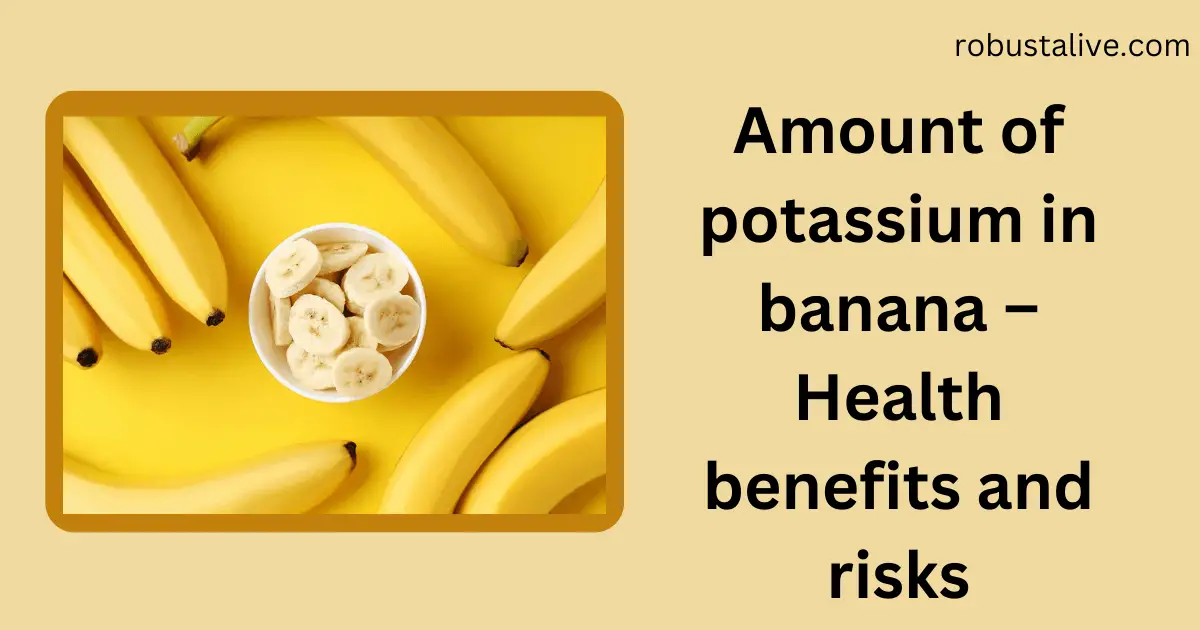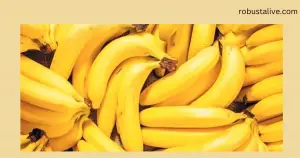Amount Of Potassium In Banana – Health Benefits And Risks

Bananas are among the most popular fruits in the world. They have a lot of vital nutrients present in them that benefit the overall health and body’s functioning. Eating bananas control your blood pressure and reduce cancer risk.
Banana is a healthy fruit that is rich in potassium. The potassium in bananas aids in maintaining the body’s fluid levels and controls the waste products and nutrients in and out of the movement. A banana’s potassium is about 422mg (medium size). Potassium also plays a role in muscle contraction and nerve cell response.
This article will give a detailed overview of the amount of potassium in bananas, their health benefits, risks, and many other associated things.
Amount of Potassium in Bananas
Bananas are the primary source of the mineral potassium. Potassium benefits in maintaining the fluid level in the body. It also regulates the waste and nutrients’ movements in and out of our body cells.
This mineral benefits muscle contraction and nerve cell response. Potassium is among the essential nutrient of our body as it keeps the heart rate at a healthy beat by reducing the sodium impact on the blood pressure.
According to the research, potassium is beneficial in reducing the risk of kidney stones as we age. As a result, healthy kidneys will ensure that you have the appropriate potassium in your body.
There is around 422 mg (milligrams) of potassium in a medium banana. The best way to fulfill the body’s nutrient requirement is like eating bananas. Otherwise, you still have the option to have it in supplement form.
Health Benefits

In the following section, I have mentioned all the detail and possible health benefits of this fantastic potassium-rich fruit.
-
Blood Pressure:
The AHA (American Heart Association recommends that people lower their sodium and salt intake and increase their intake of food that is rich in potassium. As potassium aids in reducing stress on the cardiovascular system by managing blood pressure.
A medium size banana fulfills the 9% of daily potassium requirement of a person.
-
Asthma:
A study in 2007 claims that eating bananas prevents wheezing in children with asthma. It is probably because of the potassium and antioxidants present in bananas. However, still more research is needed to prove this claim.
-
Cancer:
Laboratory investigations suggest that lectin is a commonly found protein in bananas. It benefits in the prevention of leukemia cell growth. Other claims that the children who were having orange juices and bananas had a lower risk study in 2004 of developing leukemia. The researchers claim that it can be because of bananas’ antioxidants and vitamin C content.
-
Heart Health:
Bananas have antioxidants, folate, fiber, vitamin C, and potassium. All of these are essential minerals and nutrients that benefit heart health.
In a 2017 study, the researchers found that people with a high-fiber diet were at lower risk of cardiovascular diseases than those on a low-fiber diet. People with a high-fiber diet also have a low level of LDL (Low-density lipoproteins which are generally known as bad cholesterol.
-
Diabetes:
The American Diabetes Association recommends people with diabetes eat bananas as they are rich in fiber. They suggest that eating fiber can benefit in lowering the blood sugar level.
Another 2018 review proves that a high-fiber diet can help reduce type 2 diabetes risk. It can also lower the blood sugar in people who already have diabetes.
-
Digestive Health:
Bananas have fiber and water content that promotes the digestive system’s regularity. One medium size banana provides you with 10% of your daily fiber requirement. Besides, bananas are also a central part of the BRAT diet approach. It’s a diet that is especially recommended for the treatment of diarrhea.
BRAT means bananas, rice, applesauce, and toast. Diarrhea can lead to losing vital electrolytes and water from our bodies. Bananas help in the replacement of these nutrients. According to research in 2012, high-fiber food can trigger bloating, stomach cramps, and gas in people having IBD (Inflammatory bowel disease). However, it can show an improvement in symptoms.
The Crohn’s and Colitis Foundation of America recommend eating a banana as a snack and adding them to their diet.
-
Boosting Mood and Benefiting Memory:
Bananas have tryptophan which is an amino acid. This amino acid boosts a person’s ability and mood to learn and remember new things and preserve memory.
Risks
Some people should avoid eating too many bananas as it can harm them.
- Beta-Blockers: Doctors usually prescribe these drugs to reduce the complications related to our cardiovascular system. Beta-blockers can raise the blood potassium level. A lot of potassium intake can harm the kidneys that are already not fully functional.
This condition can be fatal if the kidney doesn’t altogether remove the extra potassium from the blood. People who are using beta blockers should try having potassium-rich foods in moderate amounts.
- Allergy: In some people, bananas can trigger allergic reactions. People experiencing hives, itching, wheezing, swelling, and difficulty breathing should get immediate medical help. A severe impact can result in anaphylaxis that can threaten your life.
- Migraine: In some people eating too many bananas can result in migraines.
Nutrition Facts About Bananas
A medium-sized banana of around 118g provides 105 calories, 14.4g of sugar, 27g of carbohydrates, and 1.3g of protein. Bananas are rich in potassium; in one serving of banana, there is almost 422mg of potassium. Here is the nutrition information provided by the USDA:
- Calorie: 105
- Magnesium: 31.9mg
- Fat: 0.4g
- Vitamin C: 10.3mg
- Sodium: 1.2mg
- Potassium: 422mg
- Carbohydrate: 27g
- Protein 1.3g
- Fiber: 3.1g
- Sugar: 14.4g
Banana Varieties
There are wide different varieties of bananas around the world, and the number crosses over 1000 varieties. Till now, Musa Cavendish is the most common and popular banana and dominates the market by 45%.
Plantains are also a type of banana; almost 100 types are included in this category. You can find bananas of different kinds in your grocery stores and local markets. Try enjoying different types of this healthy and delicious fruit.
When its Best
You can buy the bananas when they are green, giving them enough time to ripen them the way you want. You can find fresh bananas throughout the year in your supermarket.
Storage
Store them anywhere at room temperature but away from direct light.
- Don’t refrigerate the green one, as it will disturb the ripening procedure.
- Bananas hangers or trees expose the bananas cluster to the required amount of oxygen. It prevents the excess moisture and pressure from collecting at the bottom ones and benefits the ripening process of bananas.
- To speed up the ripening process, store the bananas near the ripe fruits or on brown paper so that they can get the required ethylene gas for ripening. On the other hand, if you want to slow down the ripening procedure, store them away from any ripened fruit or even ripened bananas. Avoid putting them in plastic bags as they can trap excess moisture that will make them rote.
- If the bananas have ripened to a nearly brown color, remove the peel to mash and chop the pulp. You can add baked foods or freeze them to enhance the taste of your smoothies.
- Fully ripened and golden yellow bananas can be stored in a sealed produce drawer and the refrigerator. It will preserve the flavor for a week and even if the peels have started darkening.
Can eating more than seven bananas at one time kill you?
It’s sometimes said that eating bananas more than six bananas at once can be harmful. Sometimes it’s also heard that eating more than six bananas at one time can be fatal. But is it true?
Bananas are among the world’s most popular and healthy fruit. Now, if they are healthy, how can they be fatal?
It’s a fact. Potassium levels are dangerously high if you eat more than 6 bananas in one sitting. Potassium is a vital mineral in our body’s every cell and tissue. It helps generate an electrical charge that benefits the proper functioning of the cell.
It also triggers the pancreas to release insulin to maintain blood sugar levels. It also benefits the heart rate by keeping your blood pressure in check. But if the level becomes too low or high, it can give you stomach pain, irregular heartbeat, diarrhea, and nausea. Potassium chloride is a chemical present in the US lethal injections. Its high dose can result in cardiac arrest.
Which Foods have more Potassium than a Banana?
Bananas are sweet tropical fruit that is an excellent source of potassium. It’s a good thing, and almost every single body part needs potassium for proper functioning. Whether it is the kidney, heart, muscle, or nerve cells, it’s vital for every single body part as it has a specific role in cell functioning.
But if you don’t like bananas, fortunately, they are not the only ones with these benefits. Many other beneficial foods are rich in potassium.
-
Lima Beans:
They are not only high in potassium but also rich in fiber and iron. Besides, they have a low content of fat and sugar in them. You can eat them warm as a dish or cool in a bean salad. If you want them to be easy to digest, try soaking them in water for a night.
If you want quick results, boil it for 2 minutes and let it stand for a few hours. Either way, it will make them easy for your digestive system.
-
Prunes:
Prunes are also rich in fiber and are generally known as dried plumps. They go well with cheese, yogurt, and nuts. But they have lots of sugar, around 30 grams per ½ cup. Some manufacturers add extra sugar to them, so if you are trying to lose weight, limit your sugar and keep an eye on the sugar content.
If you prefer drinking the prune juice, then go with the 6-ounce. This amount will provide you with the required potassium.
-
Watermelon:
Nothing is more soothing than having a delicious watermelon in the middle of a hot summer day. But the plus point is this relaxing fruit is mostly water, which benefits in keeping you hydrated. It is also rich in nutrients like lycopene that aid in fighting inflammation while exercising on a hot day.
-
Cooked Spinach:
Thing Popeye was right? Not because of the potassium, it also delivers iron, magnesium, fiber, and vitamin C. On top of everything, it’s low in fat, calories, and sugar. You can try eating them with garlic and onion or add them to an omelet.
-
Raisins:
You can add salads, vegetables, desserts, and other dishes or have it as a snack. But be aware of the amount of sugar in them. There are approximately 260 calories in 58 grams of ½ cup. You can get the same amount of potassium with bran flakes cereal and two cups of raisins. Besides, it will be low in calorie count and sugar. Otherwise, you can also substitute it with a grain that is also rich in potassium.
Conclusion
Bananas are the most popular fruit with nutrients, especially potassium, essential to keep a body healthy. The nutrients in bananas can boost health and prevent many diseases, but they may not have the same impact on everyone.
A banana’s total amount of potassium is 422mg, which fulfills 7% of your daily potassium requirements. A diet full of vegetables and fresh fruits provides all the essential nutrients to help one be healthy.
FAQ’s
-
Is the amount of potassium in bananas enough for a day?
According to the UK National Health Service, adults should have around 3500mg of potassium daily. The average banana that weighs 125g has 450mg of potassium content.
-
Are having two bananas in a day sound?
Bananas contain nutrients, but overeating can do more harm than good. Too much of any single food can result in nutrient deficiency and weight gain. But having one or two bananas is suitable for a healthy person.
-
How much does a banana increase your potassium level?
Bananas are like a go-to food for most people to fulfill their potassium levels. In a medium size banana, there is about 420mg, which is about 12% of your daily value.
-
Do bananas cause gas?
Bananas can cause bloating and gas in some people due to their soluble fiber content. It generally occurs in people having digestive issues or people who aren’t used to having a fiber-rich diet.
References:
- https://www.medicalnewstoday.com/articles/271157
- https://www.verywellfit.com/are-bananas-bad-for-weight-loss-3495634
- https://www.medicalnewstoday.com/articles/271157
- https://www.hsph.harvard.edu/nutritionsource/food-features/bananas/
- https://www.bbc.com/news/magazine-34225517
- https://www.webmd.com/diet/ss/slideshow-more-potassium-banana
Related Reading:





